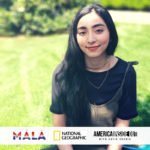To spotlight and amplify Muslim American voices, join MALA’s campaign to elevate public dialogue on Muslim-American identity in the 21st Century. In the spirit of this inspiring episode and series, we asked you to share your story with us: what is it really like to be Muslim in America? Selected stories are shared by MALA and National Geographic.
Here, Amina Khan shares her journey to defining her Islamic identity in modern America.
I define myself as an average Muslim-American. High achievements don’t have to specify how valuable I am as a Muslim; but, it’s empowering to know that no one can strip me of my religious identity. The more comfortable people are defaming Muslims, the more comfortable I am magnifying my Islamic identity.
As a Muslim woman who doesn’t wear a hijab, I have never physically felt discriminated against.
In a way, I almost felt like a coward for being sheltered from traumatic experiences Muslim women who wear hijab are accustomed to. However, it made me realize the single narrative of Muslims as Middle-Easterners who wear hijab or who have beards, is often the only narrative fed. Black Muslims, Mexican Muslims, gay Muslims, transgender Muslims, and non-hijabi Muslims do exist. Our narratives and struggle are not the same; my opinions, perspectives, and thoughts are not the same as all Muslims. But, Muslim-Americans have faced discrimination long before 9/11. Muslims are being slaughtered by ISIS, too. To deny our right to be in this country is un-American. The label ‘Muslim’ seems to cloud the fact that we are all ordinary people achieving normal things.
The first time I felt my Islamic identity was a threat, was when my first trip to Turkey landed me on FBI’s Terrorist Screening Database. I was told to change my name, since it was the only thing labeling me as a Muslim. At that time, Islam was not something I felt attached towards, but to strip my religious identity to be considered ‘American’ hit a cord.
I began to evolve my identity by praying more and learning about Islam in a spiritual way which helped me maintain serenity in my mental and emotional state. People are quick to tell Muslims what Islam is, but almost never to ask Muslims what Islam means to them.
As an aspiring journalist, I felt I was going to face obstacles being a Muslim and a woman. At the same time, I didn’t want to get hired as a journalist under the limitations of being a “token Muslim;” apparently, people are afraid we’ll be too ‘outspoken.’ Towards the end of my junior year in college, I applied to a local city magazine for an internship, not truly believing I would get an offer given the hierarchy of diversity in Dallas. I was brutally honest in my application about what it’s like to be a Muslim-American and why it’s important to let us define our narratives instead of others. Little did I know I would get three offers.
My internship at D Magazine has encouraged me to take the full opportunity and discuss topics that most people are afraid to touch. I had a chance to showcase different narratives within the Muslim community in North Texas, and I took it. From vintage fashion buyers to former NFL players partaking social activism, I hoped to illustrate the eclectic Muslim community.
Was I getting paid for this? No. I just wanted to connect with local Muslim-Americans and tell their unique story, to reflect different Muslims on a global scale. My religious identity does not speak for the entirety of the Muslim community.
I am just one story out of billions.


